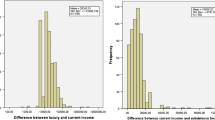Abstracts
Four methods of eliciting time preferences were tested in a pilot study, with the aim of disclosing individual time preference incorporating and excluding risk, social interpersonal preference incorporating elements of risk and social intertemporal preference. All standard gamble questions resulted in significantly higher individual time preference estimates than elicited through the time-tradeoff method. The social interpersonal preference estimate was significantly higher than the social intertemporal preference. The individual time preference elicited by the time tradeoff was, however, not significantly different from the social intertemporal preference. The analysis proposes that equity and uncertainty have significant and major impacts on the time preference over life time. Hence, applying the social intertemporal preference when estimating the present value of a stream of life-years may seriously overestimate the true present value of health streams by ignoring preferences for equity and uncertainty over life time.
Similar content being viewed by others
Author information
Authors and Affiliations
Rights and permissions
About this article
Cite this article
Gyrd-Hansen, D. Comparing the results of applying different methods of eliciting time preferences for health. Eur J Health Econom 3, 10–16 (2002). https://doi.org/10.1007/s10198-002-0098-5
Published:
Issue Date:
DOI: https://doi.org/10.1007/s10198-002-0098-5




